A maremma in the family
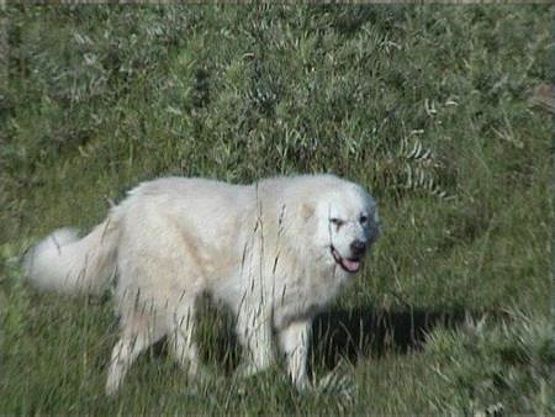
pastore maremmano abruzzese maschio, perlustra il pascolo col gregge alle sue spalle
Beauty, intelligence, even-temperedness, dignity and natural guarding instinct – these are only a few of the positive character traits of the Maremma sheepdogs. However, there is more to these white guardians that is hard to find in other dog breeds – a hint of wilderness, and the habit of treating the humans as equals and friends, not as master and Lord.
If you are looking for blind obedience and submission, this breed probably won’t do for you; but if you appreciate true friendship, a bit of humor and an insight into the rules of the pack, then The Maremma is the right dog for you.
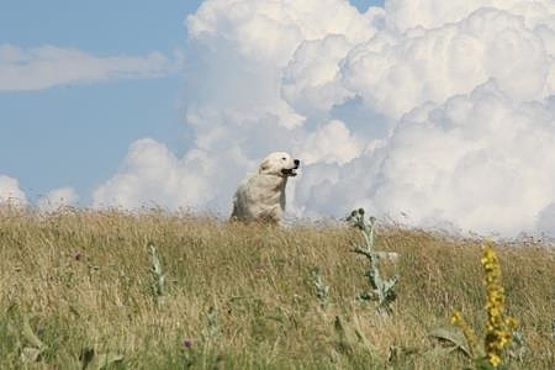
Lo scatto trasmette le caratteristiche tipiche del maremmano abruzzese, la sua serafica calma e la sicura presenza
Considering the way this breed has been used for hundreds of years, the Maremmano has learned to look after himself, to use his brain for independent thinking and hence to have a know when it’s the right moment to be proactive without waiting for human’s help. The tough and lonely life that these dogs had got used to for many years has subsequently formed their character to what we know and appreciate: affectionate towards the owner, but without submission or dependence, suspicious towards foreigners, acting on its own initiative.
Therefore, you see – a Maremma is not a dog that will passively accept commands from you or will follow you by the snap of your fingers. These dogs are very proud and dignified, combined with an innate sense of responsibility for their duty: guarding and protection of the property, being it the livestock, a territory, a house, whatever that needs to be protected.
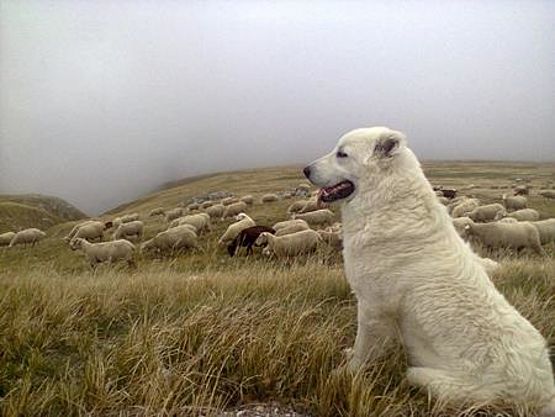
Un pastore abruzzese al lavoro a protezione del gregge di ovini, il tradizionale cane da guardiani italiano
These dogs need to be treated on a par; it’s only under this condition that they will give full satisfaction to their owners. Maremmanos are of easy maintenance: frugal with food, they love to be outside independent of the weather, being it rain or snow.
Their long and dense coat is an adaption to the environmental conditions they have been living under for hundreds of years – it protects them from the rain and the icy wind. They would rather curl up on the floor and protect their nose and feet with the tail, than being inside. Even when they seem black and muddy after having spent the night in the rain, just a few hours of dry weather are enough to make them white and shiny again, thanks to a special dirt-repellent capacity of the coat.
Many times our dogs prefer to lie down in a light rain without showing any discomfort. If there is a downpour, then they stand with their heads and tails down to encourage the eaves and dripping effect along the hairs. Every now and then they shake to prevent water from seeping in. When it is then too cold or windy, the animal curls up on the ground, bringing its tail down to protect its nose and feet.
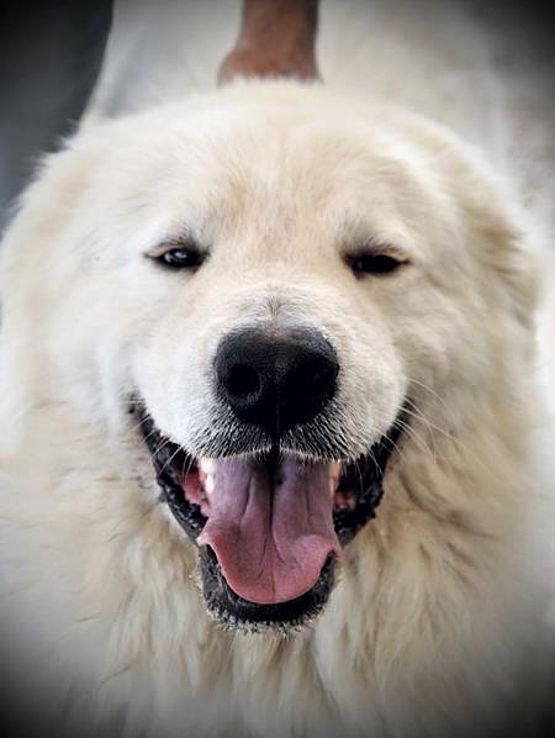
Bellissima testa ed espressione tipica di razza di cane da pastore maremmano abruzzese maschio
These dogs are very clean; in fact, you will notice that already small puppies will try to separate the “bathroom” from the place where they place and rest.
Sexual dimorphism exists in numerous dog breeds, but in the Maremmas it is particularly well developed, not only physically, but also psychically. The male, usually bigger and stronger than the female, with his leon-like mane around the neck, is less refined and more extroverted and calm, but also more competitive towards other dogs.
The female is smaller, more elegant, almost feline when moving, never clumsy or intrusive, is very sweet with the family and protective towards her pack and her territory. Contrary to what one may think it’s the female who has a better guarding attitude and is very reliable when doing this job.
Now let’s talk about a treat common to most of shepherding breeds, especially if the dogs are living in a pack of several dogs where conquest of territorial domain is of fundamental importance. Usually the strongest adult male is the one who commands, and will be disempowered and submitted by a younger rival in a tough fight when the time is ripe. While in a breeding contest the breeder will usually try to interrupt these battles by separating the rivals, in the shepherding world no one takes care about separating them; the law of the nature dictates the rules that base the cohabitation on physical and psychical strength, the verve and hence on the hierarchical scale.
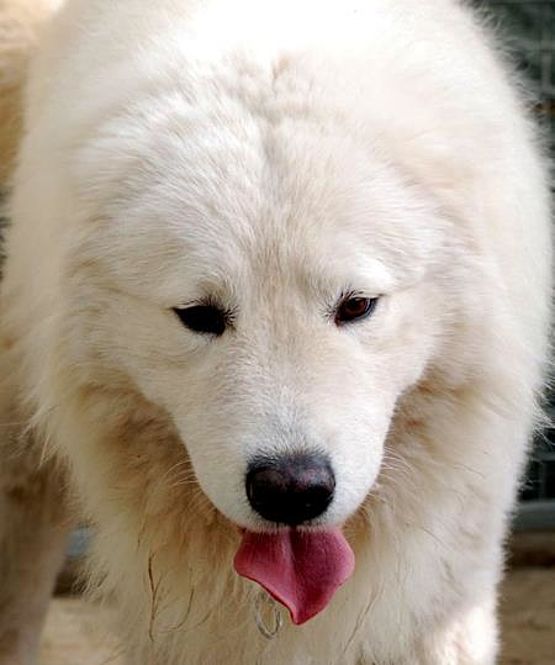
Tipica testa di un campione italiano di pastore maremmano abruzzese
Speakingof the peculiarities of the breed's behaviour in general, let us dwell on the social organization that is very much present in sheepdogs, particularly if they live in herds of several individuals, and where the conquest of territorial dominance is paramount. This is generally held by the strongest adult male, who will in turn be ousted when a young rival subdues him after a hard fight. While breeders normally intervene in these battles with the only possible system, the separation of rivals, in the herding world no one bothers to separate them; the law of nature whereby coexistence is based on physical and psychological strength, temperament, and thus on the hierarchical scale, then revives.
The life in a pack is distinguished by a strong sense of hierarchy, originating in the atavistic habit of having always lived and worked as a group, and it’s exactly as a group that they give their best at guarding the livestock. There is the leader of the pack who is in charge and all the subordinated dogs follow his commands. In some rare cases, the leader can also be a female, or both can create an Alpha-Couple.
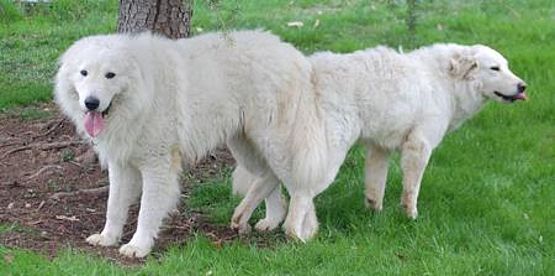
Fase iniziale di un accoppiamento di una coppia di cani da pastore maremmano abruzzesi
Another peculiarity of this breed is the difficulty in mating due to extreme hierarchical thinking. Sometimes the females don’t even come closer a male they don’t know. The male, on the other hand, if not used coming close to a female who is growling and doesn’t show any interest in mating, will not try to mate. Obviously, a female is always well disposed towards a male from her pack who has gained her interest.
Scientific background
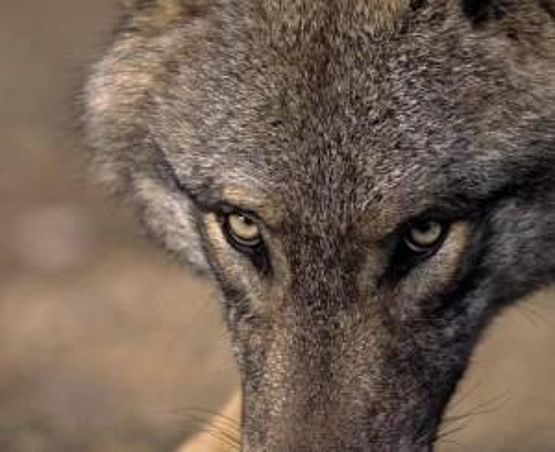
immagine di un lupo italiano appenninico
Now let’s examine the single components that distinguish the character and the behavior of our dog. In his region of origin in Italy, the Maremmano has always been working in waste spaces guarding the livestock, and the two main predators, apart from cattle thieves, have always been the wolf and the bear.
In his relation with the dog the man always needs to consider the elements that influence the behavior and the character, considering that while the former is based mainly on instincts, the latter is defined by psychical prerequisites.
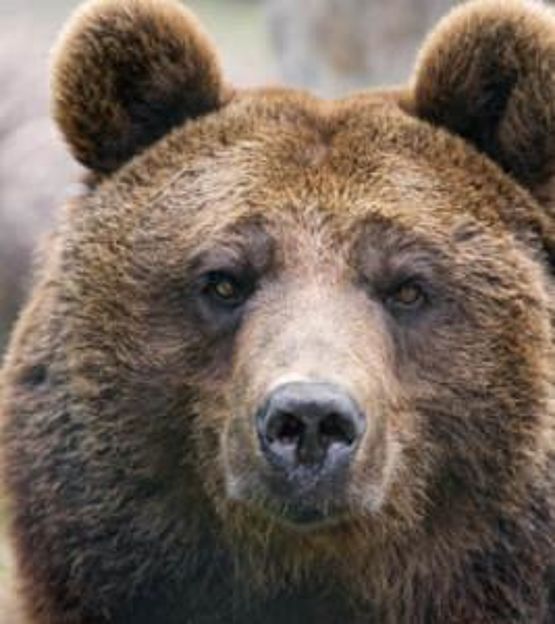
Foto di testa di un orso marsicano italiano
The behavior can be innate or acquired. While the acquired part is determined by the experiences in dog’s life that teach him to respond in a certain manner to certain stimuli, the innate one is determined by instincts. These can be defined as complex of interior impulses that lead a subject to perform a series of coordinated actions with a certin aim.
Here are those that play a major role in the development of a dog:
- Reproduction instinct that encourages mating during the heat period.
- Preservation instinct that makes him flee or back off when facing danger or opponents judged stronger than him.
- Instinct to search for food within the circumjacent environment.
- Possession instinct that leads him to protect the territory or a good entrusted on him or what he considers as entrusted on him.
- Defense instinct that leads him to be alert even when resting, benefiting from a sensorial capacity to distinguish from the numerous stimuli those he considers as dangerous.
- Pack instinct that urges him to live together with those of his kind and to search for consent within his pack.
- Submission instinct that leads him to accept the supremacy of a leader.
The first three points are of no particular interest to us, as common to all breeds (the first two) and to hunting breeds (the third one). The last four ones, on the other hand, are typical of the shepherding breeds. In the following chapter, we will see in more detail how certain psychical prerequisites determine the character of a Maremma sheepdog.
Alertness or attention capacity
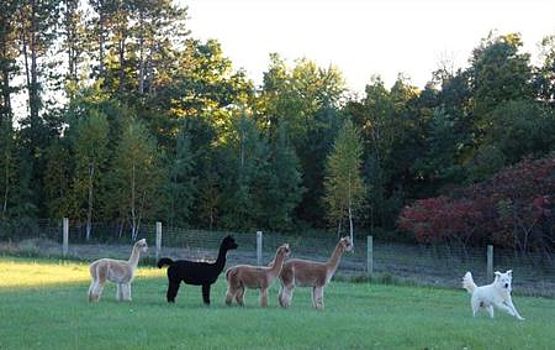
Un nostro soggetto di cane da pastore maremmano abruzzese in America a protezione di un gruppo di alpaca
This capacity is strongly related to the property instinct. An attentive and alert dog is never taken by surprise and always reacts immediately, considering his living or working environment or the goods that are under his guard subject exclusively to his competence and responsibility. Ensuing from this attitude the dog tends to decide for himself how and up to where to extend his guarding actions, without readily accepting moderating interventions by the shepherd or the owner
This behavior is the result of the dog’s idea of himself as being on a par to the human. An alliance made of mutual trust and respect, not of submission, established during hundreds of years spent more often than not alone with the herd and the shepherd in the mountain pastures and aimed exclusively at the wellbeing of the livestock.
Aggressiveness
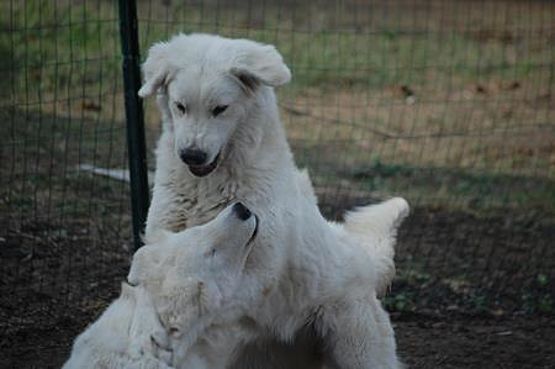
Ritualizzazione ed aggressività in cane da pastore maremmano abruzzese
There is a tendency to attack and bite anyone who comes too close and apparently with bad intentions. An aggressive dog will not hesitate to continue his attack until a different command form is given by the shepherd, but he is never aggressive just for the taste of it.
It’s necessary though to emphasize that it’s neither possible nor desirable to follow only the dog’s decisions and to question your own ones, as in the long run this may cause the dog being unsure and insecure.
On a side note, I think it may be useful to add an empirical observation: once something has caught his attention, the dog will always place himself exactly halfway between the intruder and the goods/property that he is meant to guard. He will evaluate the situation from this position and then decide whether to take actions against the intruder, or to return to his usual guarding place.
Courage and fidelity
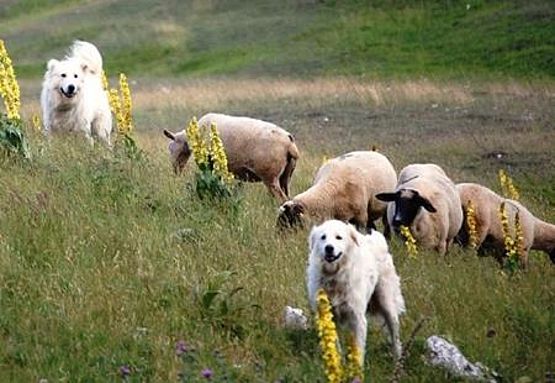
Scatto che ritrae pastore maremmano abruzzese al pascolo
The Maremma is utterly courageous and true, and these two character treats make of him a dedicated and responsible guardian, incorruptible and perfectly equilibrated, in a way that allows him to distinguish among several simultaneous stimuli those that require attention and to act consequently.
His usually calm attitude springs off from the awareness of being in the right and knowing exactly what to do. The expression of his eyes, though always attentive and relaxed, is never suspicious.
Intelligence
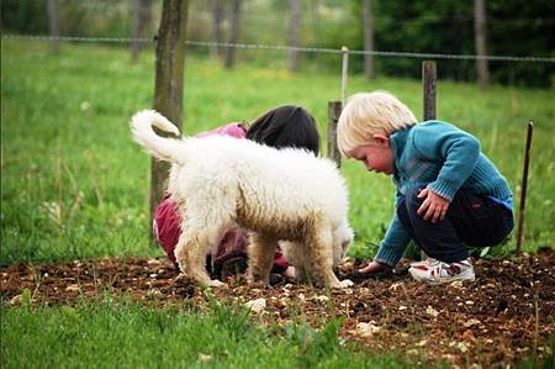
L’intelligenza del pastore maremmano abruzzese si manifesta sin da cucciolo
Intelligence is the capacity to assign a practical or conceptual significance to moments of lived experience; in animals, this encompasses more or less developed capacity to associate, to abstract and to coordinate. In a Maremma, intelligence is expressed through conscious and deliberate rather than instinctive actions, accompanied by a rather well developed memory and imagination and discernment ability.
Even though the above-mentioned capacities are rather modest compared to those of a human, and are of practical rather than ideal kind, they still can reach levels that allow the Maremma to comprehend the human on verbal and non-verbal level.
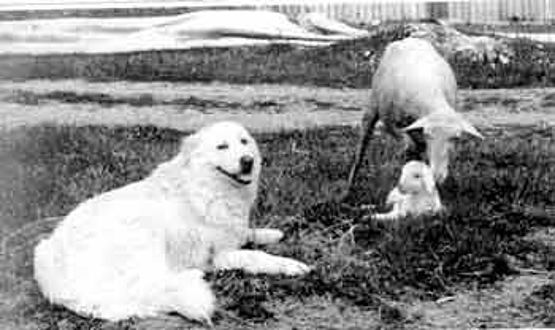
Un pastore maremmano abruzzese aspetta con pazienza che l’agnello si alzi da solo
It’s thanks to intelligence that the Maremma is able to perform actions that to the outsiders may seem exceptional. This is how it seems to us, when the dog decides all on his own to separate from the herd he’s guarding in order to escort a hurt sheep, a newborn lamb or any animal that that may have trouble following the herd at the right pace; or when he waits patiently beside a sheep that’s giving birth, to accompany her later back to the herd.
Considering this behavior one may be tempted to attribute it to some kind of training, but it’s not true. It’s important to remember that there is no training in the common sense of this word for a Maremma, his actions and behavior are rather a result of an assimilation process, imitating adult and more experienced dogs of the pack he’s living with.
In the shepherding world the psychical deviations such as fear, inhibition in front of danger, tendency to flee or useless aggressiveness, do not exist as they are considered substantial character defects, some of which may be innate, some maybe result of a irrational relationship with humans. They are incompatible with the necessities of the shepherding, on the one hand because they disturb the equilibrium of the pack, on the other hand because it’s nearly impossible to eliminate them. Usually the shepherd can foresee the development of such character traits and removes animals that do manifest them from his livestock guarding pack.
